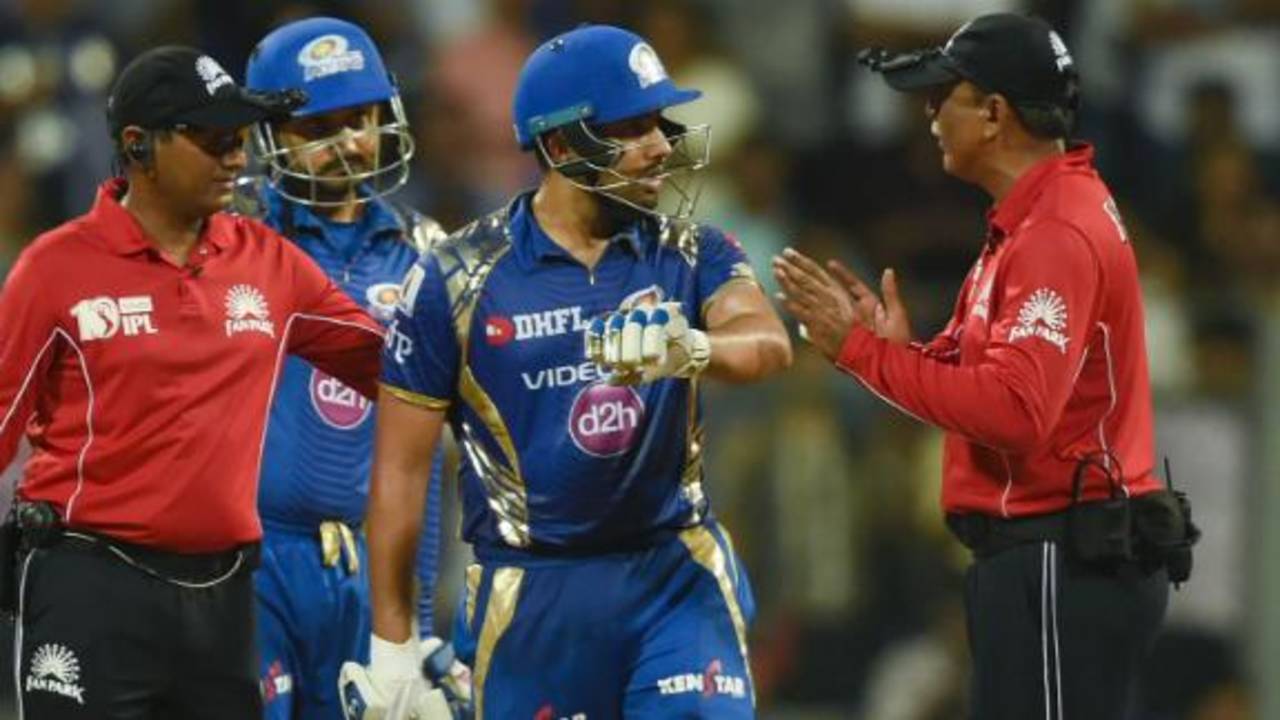Mumbai Indians needed 17 runs off the last over against Rising Pune Supergiant to complete their seventh straight win in IPL 2017, but their pursuit received a jolt on the first ball as Hardik Pandya holed out to deep extra cover. Their captain
Rohit Sharma, though, had piloted Mumbai's chase up to that point and was intent on seeing things through. With one almighty swing at Jaydev Unadkat's slower ball, he brought the equation down to 11 off four balls.
Unadkat's next delivery was going to be another slower one, but having seen Rohit shuffle across the stumps, he pushed it wide. Rohit, on the other hand, realised that the ball was veering away from the guideline for wide deliveries, and left it alone. However, when umpire S Ravi didn't call it a wide, Rohit shrugged in disbelief, and remonstrated with Ravi even as the square-leg umpire A Nand Kishore intervened. With 11 needed off three balls now, Rohit miscued a slog and was caught-and-bowled for a 39-ball 58, and eventually Mumbai went down by three runs.
In the post-match media interaction, Harbhajan Singh and Ajinkya Rahane, representing Mumbai and Rising Pune respectively, had contrasting views on the legality of the contentious delivery. Neither player, however, felt Rohit's animated conversation with the umpire was a serious transgression.
"I think it was the right call," Rahane said. "Because, as a batsman when you move [across the stumps], that area outside [the off stump] goes to the bowler. Rohit's behaviour at that point was natural. As a captain, as a player, when the game is so close, it comes automatically; nobody does it deliberately. I don't think there was anything wrong with his behaviour, but the umpire's call was right too, for us.
"It happens on the field and remains on the field. In this format, in close games, this will happen in the future as well. You should respect the umpire's decision as well as whatever Rohit did that was completely natural."
Harbhajan also said Rohit was only checking with the umpire what the rule was. "He didn't shout at the umpire or ask why it wasn't given a wide," he said. "He just wanted to know where he should stand for the wide to be called and he was told that the amount he moves is the amount of margin the bowler gets."
While Harbhajan felt the ball was fairly wide off the guideline, he said the umpire's decision had to be respected. "I don't really know if it was actually a wide ball or not," he said. "I feel if both the legs of the batsmen move across the stumps, then the bowler should get the [benefit of the] margin. But, if you see, only one leg of the batsman went across, so I feel it should have been a wide. But, in the end, whatever is the umpire's decision we have to move on with it."
Harbhajan, though, didn't agree with the suggestion that the argument over the wide had led to a loss of momentum for Mumbai.
"I don't think momentum was lost, because Rohit was hitting the ball nicely, but [it was] unfortunate that he ended up hitting the [next] ball straight up in the air," he said. "Cricket is a game where anything is possible. Just before that he hit a big six and a similar sort of ball went up and he got out. At that point all you need to do as a batsman was see the ball and hit the ball, and Rohit was batting on 50-odd."
While Harbhajan admitted that the penultimate over, where Ben Stokes conceded only seven runs, was crucial, Rahane revealed the thinking behind giving Unadkat the ball in the last over. He said Unadkat was preferred to Shardul Thakur because of his relatively slower pace.
"I think after the 19th over when [Steven] Smith, Mahi bhai [MS Dhoni] and I were discussing, we talked about bowling Shardul or Jaydev," Rahane said. "But we opted to bowl Jaydev because Shardul has quite a bit of pace, and we wanted to take the pace off and not give the batsmen any in the last over.
"JD's pace comparatively is slower than Shardul and his slower ball could be more effective as the wicket was slow. We didn't want to give them any pace because Rohit was already set. One side [of the ground] was very short, so that was the plan for the last over."
The dismissals of Kieron Pollard and Hardik Pandya were also a result of smart thinking and understanding of angles. Rising Pune had three fielders in the V for Pollard - a long-off almost right behind the bowler in addition to a conventional long-off and long-on - and as many fielders on the bigger off-side boundary for Pandya.
"We knew Pollard doesn't play the lap sweep, so we wanted to keep two fielders straight - one right on the sightscreen and one slightly wider," Rahane said. "That worked for us. For Hardik, he likes to play over covers and the boundaries were bigger too, so that's why we brought square leg in and had three fielders on the line on the offside."
Arun Venugopal is a correspondent at ESPNcricinfo. @scarletrun
